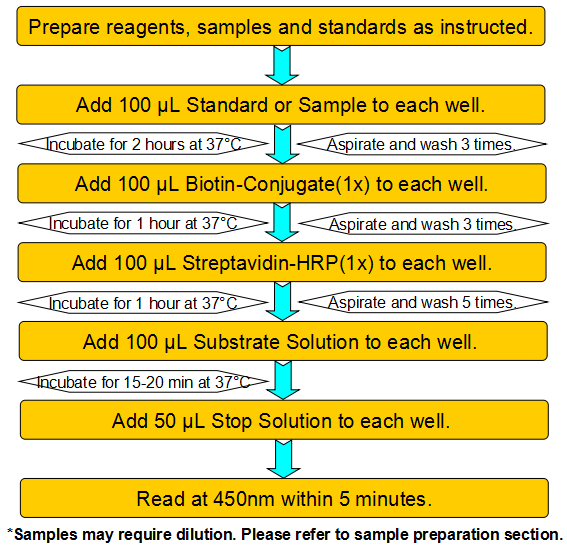Current Position:Home>>Elisa Kit For Food Safety & Drug Residues>> Trimethoprim (TMP) ELISA Kit
Cat.No.: AE81051SF
Welcome to order from local distributors.
Add to cart Bulk requestFor research use only. Order now, ship in 3-5 days




| Species Reactivity | N/A |
| UniProt | N/A |
| Abbreviation | TMP |
| Alternative Names | N/A |
| Range | 0.03-2.43 ppb |
| Sensitivity | 0.03 ppb |
| Sample Type | Tissue, feed, serum, plasma, urine, etc. |
| Detection Method | Competitive ELISA |
| Analysis Method | Quantitive |
| Assay Duration | 1-3h |
| Sample Volume | 1-200 μL |
| Detection Wavelengt | 450 nm |
Reagents |
Quantity |
Reagents |
Quantity |
Assay plate (96 Wells) |
1 |
Instruction manual |
1 |
Standards |
6 x 1 mL |
Redissolving Solution (concentrate 2 x) |
2 x 20 mL |
Antibody |
1 x 6 mL |
HRP-Conjugate |
1 x 6 mL |
Wash Buffer (concentrate 20 x) |
1 x 20 mL |
Stop Solution |
1 x 6 mL |
Substrate A |
1 x 6 mL |
Substrate B |
1 x 6 mL |
Adhesive Films |
4 |
Sample Type |
Number |
Recovery range (%) |
Average(%) |
Serum |
10 |
90-101 |
96 |
EDTA plasma |
10 |
89-97 |
93 |
Heparin plasma |
10 |
91-99 |
95 |
Sample Type |
1:2 |
1:4 |
1:8 |
1:16 |
Serum |
78-89% |
81-99% |
92-103% |
95-105% |
EDTA plasma |
91-101% |
90-98% |
93-101% |
91-98% |
Heparin plasma |
92-103% |
93-102% |
92-99% |
91-101% |